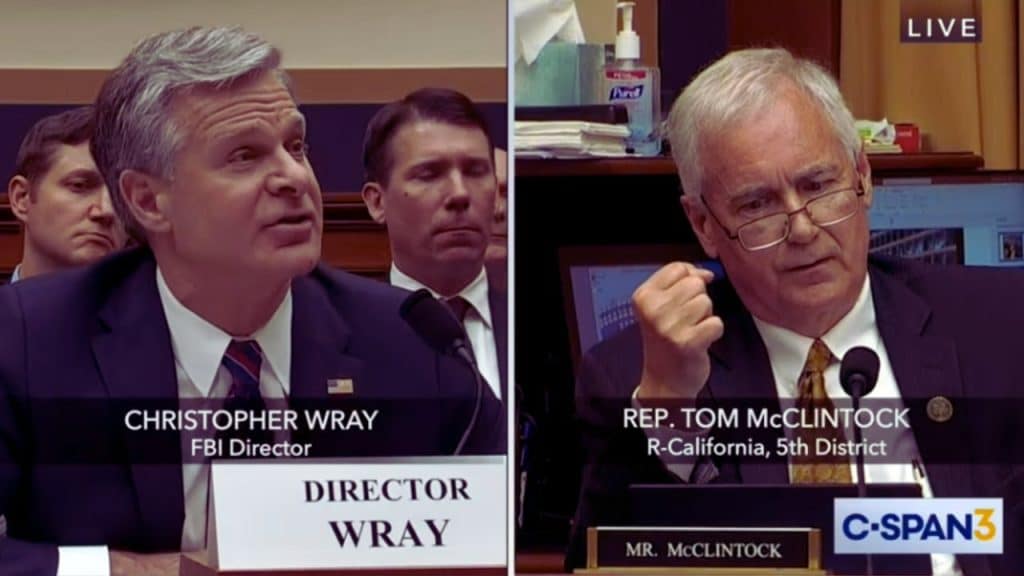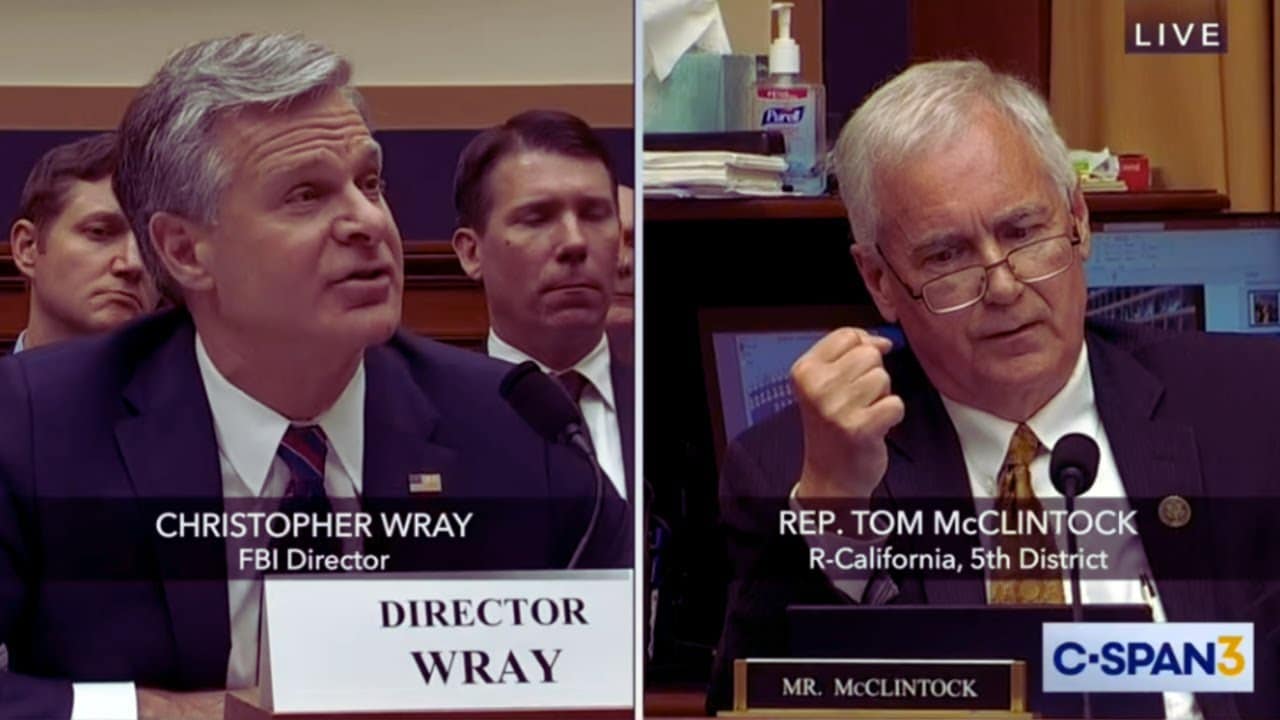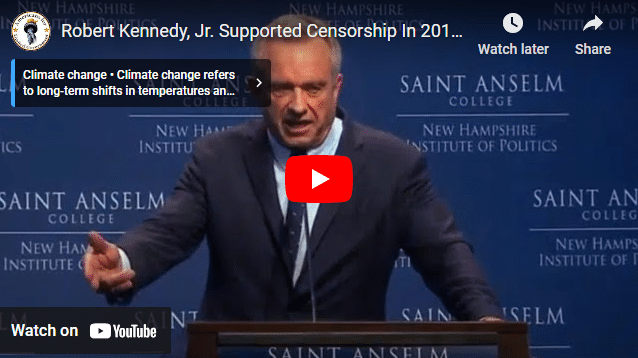July 17, 2023
Permission to republish original opeds and cartoons granted.
Wray: ‘Not to my knowledge.’ Does the FBI use intelligence and electronic FISA surveillance in criminal prosecutions via parallel construction?

By Robert Romano
“Not to my knowledge.”
That was FBI Director Christopher Wray’s response to questioning from U.S. Rep. Tom McClintock (R-Calif.) at the House Judiciary Committee on July 13 about whether the Justice Department and FBI utilize parallel construction — where law enforcement agencies are handed information obtained from Foreign Intelligence Surveillance Act (FISA) warrants or via warrantless surveillance by intelligence agencies, not unlike the FISA surveillance of the Trump campaign in 2016 that became the Russiagate counterintelligence and eventually criminal investigation — and then act on it.
McClintock defined the term for Wray, stating it includes “the FBI using forbidden information from a 702 search to alert local law enforcement to search for and then produce the same material without revealing that it came from an improper search…”
At first Wray tried to dodge the question, stating, “I’m just not sure about the use of the term.”
But McClintock wasn’t having any of that, asking on follow-up, “has the FBI ever employed that particular tactic in prosecuting American citizens?”
This generated Wray’s “not to my knowledge” reply, whereupon he added, “but again, I can look into that and get back to you.”
Yeah, we’re sure Wray will get right on top of that. In the meantime, Wray, who oversees the FBI’s use of FISA surveillance, knows full well how the process works, and what law enforcement has access to and what it doesn’t, and what is admissible in courts of law and what isn’t.
Unfortunately, this isn’t a hypothetical question. In the aftermath of the Sept. 11, 2001 terrorist attacks on the World Trade Center and Pentagon and the downing of Flight 93 in Pennsylvania, with the passage of sections 218 and 504 of the U.S. Patriot Act and other countermeasures deployed by Congress and former President George W. Bush, the so-called “wall” between intelligence agencies and law enforcement was torn down after it was revealed that the attacks could have been potentially averted had law enforcement known what intelligence agencies knew.
Testifying before the Senate Select Committee on Intelligence on April 27, 2005, former Attorney General Alberto Gonzales and former FBI Director Robert Mueller outlined how Section 218 worked: “Section 218 of the USA PATRIOT Act eliminated the ‘primary purpose’ requirement. Under section 218, the government may conduct FISA surveillance or searches if foreign intelligence gathering is a ‘significant’ purpose of the surveillance or search. This eliminated the need for courts to compare the relative weight of the ‘foreign intelligence’ and ‘law enforcement’ purposes of the surveillance or search, and allows increased coordination and sharing of information between intelligence and law enforcement personnel… This change, significantly, did not affect the government’s obligation to demonstrate that there is probable cause to believe that the target is a foreign power or an agent of a foreign power.”
And in Section 504, similarly, allowed intelligence agencies to share information obtained under FISA with law enforcement: “Section 504—which is not subject to sunset—buttressed section 218 by specifically amending FISA to allow intelligence officials conducting FISA surveillances or searches to ‘consult’ with federal law enforcement officials to ‘coordinate’ efforts to investigate or protect against international terrorism, espionage, and other foreign threats to national security, and to clarify that such coordination ‘shall not’ preclude the certification of a ‘significant’ foreign intelligence purpose or the issuance of an authorization order by the FISA court.”
Or, in other words, parallel construction. That is, information that law enforcement would otherwise never have in its possession is given to them via procedures that might not be approved by a federal, state or local judge in issuing a search warrant, is used to then obtain said search warrant and to develop criminal leads. On its face, the practice appears to run afoul of the Fourth Amendment’s protections against unreasonable searches, but in the post-9/11 desperate times call for desperate measures outlook, threats to national security were viewed differently.
Although Sections 206 (roving wiretaps) and 215 of the U.S. Patriot Act expired in 2020, the aforementioned provisions removing the “wall” between intelligence and law enforcement remain in effect.
In a June 11, 2014 speech and question and answer by Mueller at Georgetown University, where he received a question about the concept of parallel construction from Ray McGovern of Veteran Intelligence Professionals for Sanity. McGovern too defined the use of the term, stating, “the FBI and DEA have used information originally acquired by from [the National Security Agency] NSA, but information that would not stand up in court, and they have parallelly constructed cases enabled by the NSA information to make it appear your excellent detective work has worked.
In his remarks, Mueller similarly demurred to the use of the term stating, “That’s not a word that I’m familiar with or use.”
But then Mueller, no longer employed by the federal government at that time, went on to defend the practice, saying, “Often there are differing ways that you obtain information that may be consistent, may be inconsistent, some may be classified at a different level than others and so long as I am satisfied that it’s within the law and judges have upheld that capability, then I’m okay with it.”
Pressed further on the constitutionality of the practice, Mueller drew a clear distinction between the admissibility of such information in a court of law and its acquisition by the law enforcement agency — and its presumed use as a cheat sheet.
“You can acquire information as we do under the FISA statute for instance, but that does not mean it can be used for other purposes without perhaps other judges’ approval… [It] may not be admissable for a variety of reasons but that does not prevent us from acquiring it,” Mueller stated. In other words, the information may not be admissible in court, but that does not mean the FBI cannot read and absorb its content for later use.
So, there are clear cut and yet constitutionally suspect provisions of law, and admissions by officials, that allow intelligence and electronic surveillance under FISA and the so-called “FISA database” to be used for law enforcement purposes.
But what is the FISA database, something obliquely and repeatedly referenced by members of Congress in questioning Wray? Since, FISA is used for electronic surveillance, we have to assume that it is a database of electronic surveillance for anyone that’s ever been targeted under FISA, their contacts and presumably their contacts’ contacts, and so forth. In order words, classified mass surveillance, as approved by Congress that it often acts unknowledgeable of when questioning Justice Department and intelligence agencies officials, not because of any deliberate deception, but usually because the sources and methods used are classified and therefore are spoken about as if they were hypothetical in the context of a public Congressional hearing.
That is how Wray can likely get away with saying “not to my knowledge” in response to a direct question about whether and how the Justice Department and FBI use intelligence and surveillance information to produce criminal investigations, even though just two decades ago, the Justice Department and FBI were proud of the provisions of the Patriot Act that tore down the “wall” between intelligence and law enforcement.
Of course Wray knows about it. He is responsible for administering this system. And then to complain about the use of the term, as if that was the point of the question. Yes, there’s a presumption made by McGovern and McClintock that the practice is unconstitutional and should be inadmissible in a court of law, but a fine answer would be that Congress authorized it. Often, we depend on federal courts to clean up the messes that are caused by Congress or the states, and serious problems arise when they don’t, leading to decades long practices like racial segregation and discrimination or in this case, mass surveillance.
But there is the muddier question about what the technological limits, if any, of the surveillance include. In 2013, former National Security Agency (NSA) head Gen. Keith Alexander in testimony to the Senate Appropriations Committee on June 12 admitted that phone metadata on everybody is in fact being collected in real-time, stating, “If we didn’t collect that ahead of time, we couldn’t make these connections, so what we create is a set of data and we put it out here and then only under specific times can we query that data.”
Here, Alexander was referring to the periodic collection of phone records by the agency from Verizon and presumably all other phone carriers, enabling the agency to go back in time and see who called who, at what time, and for what duration.
Alexander justified the practice and referred to a problem encountered during the 9/11 terrorist plot, stating, “We all had this concern coming out of 9/11. How are we going to protect the nation because we did get intercepts on [hijacker Khalid al] Mihdhar, but we didn’t know where he was, we didn’t have the data collected to know that he was a bad person.”
Alexander continued, “And because he was in the U.S., the way we treat it is he’s a U.S. person, so we had no information on that.” So, the collection of the phone metadata on U.S. persons on an ongoing basis, therefore, is to enable the agency to be able to connect the dots on an impending domestic terrorist attack and potentially prevent it.
Alexander hypothesized, what if this system had been in place? “Because we had stored that data in a database, we now have what we call a reasonable, articulable suspicion, we could take that number and go backwards in time and see who he was talking to and if we saw there were four other groups, we wouldn’t know who those people were, we’d only get the numbers, we’d say this looks of interest, and pass that to the FBI.”
At this point in his testimony, Alexander was still only referring to the phone metadata, and how it is being accessed. But how does this process work? He explained, “The methodology would be let’s put into a secure environment call details — these are to-from records, and at a selected time. So we don’t know anything that’s in there, we won’t search that unless we have some reasonable, articulable suspicion about a terrorist-related organization.”
He added, “The system just gives us back who he was talking to, but if you didn’t collect it, how do you know who he’s talking to? And so the issue really becomes if you don’t have the information.”
Alexander asked, “How do we solve this problem?” Now we know, thanks to the 2013 disclosures of former NSA contractor Edward Snowden, which is that the government decided to collect all of the phone records domestically. Then, he added, “once we identify a person of interest, it goes to the FBI.”
The hearing then turned to court orders and warrants, and getting at the content of those past communications. Sen. Dianne Feinstein (D-Calif.), then chair of the Senate Intelligence Committee, asked Alexander, “It’s my understanding you have the metadata, you have the records of what appears on a phone bill, and if you want to go to the content, then you have to get a court order.”
Alexander responded, “It’s correct,” adding later, “Sen. Feinstein, if you want to get the content, you’d have to get a court order.” Read between the lines. They have the content.
This came up again on May 1, 2014 on CNN’s Out Front with Erin Burnett. Burnett asked former FBI Counterterrorism Agent Tim Clemented if the government could listen in, after the fact, to telephone conversations between Katherine Russell, widow of the deceased Boston terrorist bombing suspect, Tamerlan Tsarnaev, and her late husband.
Clemente nonchalantly claimed it was possible: “[T]here is a way. We certainly have ways in national security investigations to find out exactly what was said in that conversation.”
Burnett was shocked, asking again: “So they can actually get that? People are saying, look, that is incredible.”
Clemente responded, “No, welcome to America. All of that stuff is being captured as we speak whether we know it or like it or not.”
On May 2, 2014, CNN’s Carol Costello followed up with Clemente, with Clemente doubling down on the claim, stating, “on the national security side of the house, in the federal government, you know, we have assets. There are lots of assets at our disposal throughout the intelligence community and also not just domestically but overseas. Those assets allow us to gain information intelligence on things that we can't use ordinarily in a criminal investigation, but are used for major terrorism investigations or counter intelligence investigations.”
Clemente added, “I'm talking about all digital communications are -- there's a way to look at digital communications in the past. I can't go into detail of how that's done or what's done. But I can tell you that no digital communication is secure. So these communications will be found out. The conversation will be known.”
2 + 2 = 4. The government has the capability of capturing all digital communications, store it in the FISA database to later be used in the producing criminal investigations. If Congress doubts it, they can call all these people back to testify about the practices used and what’s already been read into the Congressional record by Justice Department officials.
Section 702 of FISA is up for renewal at the end of this year, and unless something changes, it should easily pass both chambers of Congress without much discussion about matters that are classified and yet highly relevant to how our constitutional and political systems operate and are allowed to operate, especially within the context of presidential campaigns, which we now know thanks to Russiagate are subjected to FISA surveillance.
We’re made to believe that spying on the Trump campaign beginning in 2016 — which ended up being the basis for falsely targeting former President Donald Trump and his staff both from the campaign and even in the administration in a twisted fantasy that they were nefarious Russian agents when it wasn’t true — was a one-off, a highly exceptional case. But that is simply because the matters related to the Russia investigation have been declassified to the point where officials can speak about them publicly.
What would be fantastical in this context would be if the Justice Department and FBI weren’t monitoring federal bureaucrats and even elected officials and their staffs to prevent potential infiltration by foreign actors. Russiagate wasn’t the exception, it was the rule. That is the starting point, the presumption anybody in Congress must proceed from, that this is routine, in order to begin to unravel the breadth of what has been done to this country in a technological age of seemingly limitless digital capabilities combined with the ever-present dangers posed by nuclear, biological, chemical and other weapons of mass destruction.
That is, the fear that if the nation’s national security monitoring systems were ever turned off — if constitutional privacy protections under the Fourth Amendment were set ahead of national security protections — we would be attacked again, potentially in devastating fashion. Fearing this, Congress has routinely acquiesced to their reauthorization, and if that was all it was ever used for, might even be something the American people could even be persuaded to support, as they did in the 2000s following 9/11. But that isn’t all it is being used for, as evidenced by Russiagate. It was used for politics and to interfere with our electoral process by using the specter of government investigations to paint political opponents as foreign agents, falsely as it turns out.
Although both former FBI Director Mueller and later the current FBI Director Wray claim to be unfamiliar with the term parallel construction in using intelligence and electronic surveillance in formulating criminal cases once defined, being out of office, Mueller gave an honest answer about how he viewed the practice, and Wray when pressed if the FBI utilizes the tactic says "not to my knowledge" but offered he'd look into it. I’m not so confident a sitting FBI Director and other current officials can testify fully about these matters.
Meaning, as the House and Senate more fully reconsider FISA in the context of how it has been weaponized for political purposes, particularly in Russiagate but obviously in other sensitive political matters we simply have not heard about yet because they remain classified, it is likely a good idea to speak to former officials.
Of course, the question is not whether they like or are familiar with the terminology per se, it's about whether the Justice Department gleans intelligence from FISA and other surveillance and passes it along to law enforcement. And it’s not even whether it is warrantless or not. The FISA court issues rubber stamp warrants all the time. It’s why Congress keeps authorizing it. Finally, it is a question what are the technological limits (if any) to how much information can be gleaned from digital communications from the past, and what is included in the FISA database akin to George Orwell’s warning of Big Brother in his novel, 1984.
The truth is, there is no wartime or national security exception to the Fourth Amendment. And yet, the American people will still likely support measures solely aimed at protecting national security like preventing a nuclear or other WMD attack, but once these surveillance technologies and authorities are used for politics — as they have been — public support and the consent of the governed withers.
If these agencies wish to retain these authorities in the future, maybe it’s time to start fessing up, document all the abuses and come up with a comprehensive plan to prevent them in the future, or else all bets may be off. Continuing to cover these abuses up, and playing dumb and pretending they occur “not to my knowledge” is bullshit and will not foster confidence in the system Congress is being asked to reauthorize with the biggest rubber stamp of all.
Robert Romano is the Vice President of Public Policy at Americans for Limited Government.
Video: Robert Kennedy, Jr. Supported Censorship In 2014 Against ‘Climate Deniers’
To view online: https://www.youtube.com/watch?v=hxDPwPSd-Ek
Video: Kellyanne Conway and Kaleigh McEnany hit back Against Left Wing Media Swamp

To view online: https://www.youtube.com/watch?v=XBPwjbd05HE


